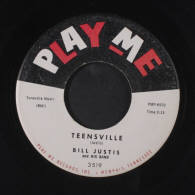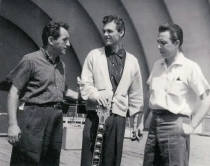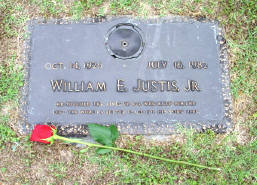
Bill Justis was an American pioneer rock and roll musician, composer, and musical arranger, best known for his 1957 Grammy Hall of Fame song, Raunchy. Raunchy was the birth of the first Rock 'n' Roll instrumental song.
Bill Justis

Bill Justis was an American pioneer rock and roll musician,
composer, and musical arranger, best known for his 1957 Grammy
Hall of Fame song, Raunchy. Raunchy was the birth of the first
Rock 'n' Roll instrumental song.
Justis was born in Birmingham, Alabama, United States, but grew up in Memphis, Tennessee and studied music at Christian Brothers College (high school department) and Tulane University in New Orleans, Louisiana. A trumpet and saxophone player, while in university he performed with local jazz and dance bands. He returned home to Memphis in 1951 and was eventually taken on by Sam Phillips at Sun Records where he recorded music for himself as well as arranged the music for Sun artists such as Jerry Lee Lewis, Roy Orbison, Johnny Cash, and Charlie Rich, the latter of which he is credited with discovering. Released in September 1957, his song "Raunchy" was the first rock and roll instrumental hit, and its popularity was such that it reached No. 2 on the American Billboard chart by three different artists, Ernie Freeman for Imperial, and Billy Vaughn on Dot. It also reached No. 1 for three weeks in Canada and reached No. 11 in the UK Singles Chart. It sold over one million copies, and was awarded a gold disc. Justis had one other significant hit record, "College Man", that went to U.S. No. 42, and No. 11 in Canada
Bill Justis upon hearing that a certain Rock n' Roll musician made a lot of money, put down his trumpet for a saxophone, bought $80 of Rock n' Roll records, and set his sights on stardom. His May "57 hit "Raunchy" gets it's title from a magazine article on current teenage slang. Justis and Manaker concocted the song in Justis' home while making fun of Rock n' Roll, convinced that they too could do it well if only they tried. Bill Justis was older than most teenage Rock fans, and had little interested in Rock as a musical style. However he soon realized that Rock's basic and simple sound was actually harder to achieve then first thought. "Raunchy" became the first Rock n' Roll instrumental song.
"Raunchy " was a little Southern tune that Justis' just couldn't get out of his head. Originally named "Backwoods" it was a tune that he recalled from his childhood in Birmingham, Alabama.

Sid Manker
There was nothing sophisticated about "Raunchy" - teenage slang for dirty or messy - which came out in November, 1957. It consisted of Sid Manker playing a short guitar riff over and over, alternating with Justis on tenor sax leading the Sun house band. The only thing remarkable about the recording was the riff and the unorthodox way Manker played it. Rather than play in the middle string range, as most rock and country guitarist would, Manker used the bass strings, further exaggerated by the studio echo.
"Raunchy" shot up the Billboard charts, just missing becoming #1 and staying in the Top 40 for fourteen weeks. The record became a classic, one of rock's first true instrumentals, but Justis would have only one other charting record, "College Man" (#42)

Unlike other Sun artists, Justis was well educated, from a well to do family, and had formal musical training. In 1957 Justis became music director for Sun, arranging hits for Johnny Cash, Jerry Lee Lewis, and Rich. Justis eventually left Sun after a fight with Phillips, and for a brief time produced for his own label Play Me Records. In 1961, Justis moved to Nashville where he became a successful record producer and music arranger for both pop and country music performers at Monument and Mercury Records and other labels.He played saxophone on the soundtrack for the 1964 Elvis Presley film, Kissin' Cousins and that same year took over as manager of the singing group, Ronny & the Daytonas. Before his death from cancer in 1982, Justis wrote the musical scores to Burt Reynolds film "Smokey and the Bandit", and later produced major hits for Bobby Vinton.
In the early 1960s he produced a successful series of instrumental albums on the Smash label (Alley Cat/Green Onions, and Telstar/The Lonely Bull).

(L-R) Lester Sill, Duane Eddy and Lee Hazelwood
Neither Justis or Manker, who remained a session man at Sun, capitalized on the uniquely original guitar sound they had created. That would fall to an enterprising deejay, Lee Hazlewood in Phoenix Arizona, and his 19 year old protege, Duane Eddy.

Bill Justis died of cancer July 16, 1982 in Nasheville at the age
of 55 and was buried in Memorial Park Cemetery in Memphis.